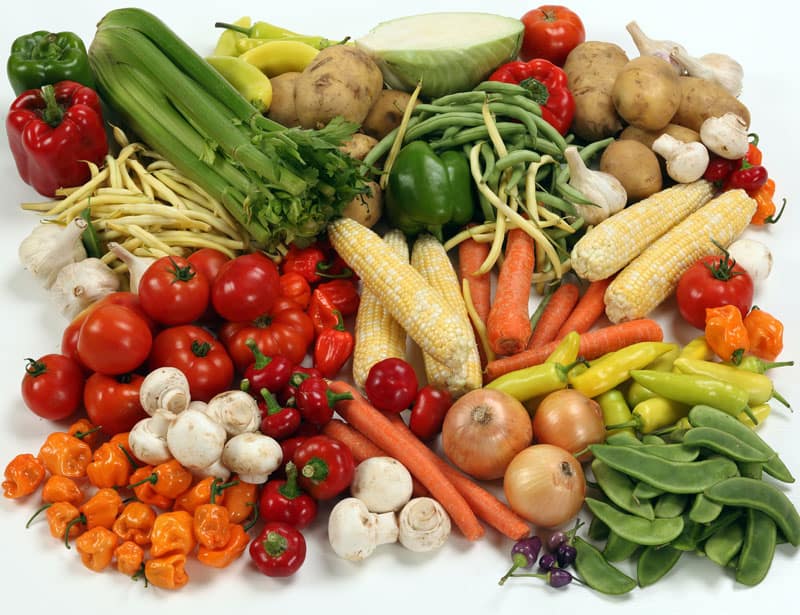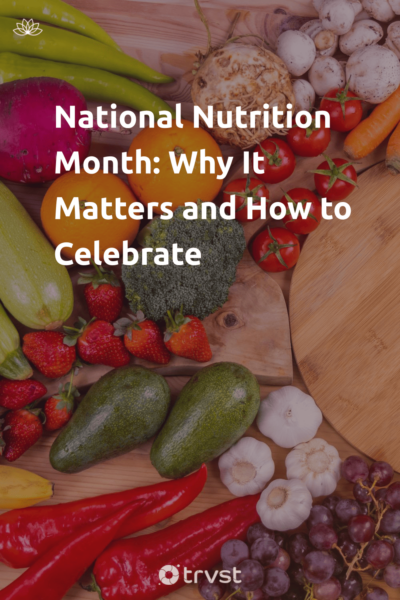National Nutrition Month: Why It Matters and How to Celebrate
March is National Nutrition Month. The Academy of Nutrition and Dietetics organizes this celebration and focuses on making informed food choices and embracing healthy eating habits.
This is especially relevant today as recent statistics show that poor diet and inactivity contributed to the 16.6% death in the U.S. alone in 2000.
Nutritionists and dietitians promote a balanced diet and regular physical activity as ways people and communities can achieve a healthier lifestyle. Moreover, National Nutrition Month is an opportunity to discuss urgent issues such as malnutrition, obesity, and diet-related diseases.
Featured in: March - Awareness Months, Days & Observances.
National Nutrition Month History and Background

In March 1973, the American Dietetic Association, now the Academy of Nutrition and Dietetics, created National Nutrition Week. The group aimed to increase health awareness and promote dietetics as a field of inquiry. Thankfully, National Nutrition Week was well-received; it covered the entirety of March in 1980.
Choosing March was not for an arbitrary reason. The Academy saw March as a time for new beginnings, coming off the heels of the holiday season and into summer. The Academy chooses a yearly theme to guide the month's activities and discussions.
National Nutrition Month owes its success to Jean Hankin and Neva Cochran, influential figures in nutritional epidemiology and dietetics, respectively. Their efforts have significantly changed schools, communities, and health organizations nationwide. With their guidance, the Academy of Nutrition and Dietetics has also published essential nutritional guidelines and shaped public health policies.
The Cause and Its Challenges
National Nutrition Month emphasizes the importance of balanced nutrition to our health. The Academy of Nutrition and Dietetics stresses the need to make informed food choices, adopt good eating choices, and engage in physical activity habits. However, personal and global obstacles can hinder progress in this endeavor. One major challenge is the rising obesity rate linked to unhealthy habits and sedentary lifestyles1.
According to the CDC, 42.4% of U.S. adults were obese in 2017-2018. The popularity of fast food chains and the aggressive marketing of unhealthy products, particularly toward young people, may have influenced the numbers.
Another factor to consider is food security since access to nutrient-rich food is only guaranteed for some. In 2020, the USDA found that 10.5% of U.S. households lacked consistent access to quality food for a healthy life. People need food security to resort to cheaper but less healthy options. Socioeconomic disparity limits lower-income communities' access to nutritious food.
5 Reasons National Nutrition Month Matters

- National Nutrition Month highlights the significance of food in our lives, emphasizing a diet comprising all food groups rather than simply avoiding unhealthy foods. Research suggests this dietary approach can improve overall health, support weight management, and lower the risk of chronic diseases.
- Moreover, National Nutrition Month stresses the need to add physical activity habits to our daily lives. Balancing exercise and a nutritious diet is crucial for overall health2. Routine exercise can help us maintain a healthy heart, tone our muscles, strengthen our bones, and uplift our mood.
- However, the campaign acknowledges that no single diet regimen is effective for everyone. Individuals have different nutritional requirements depending on age, gender, activity levels, and overall health. Still, everyone must make healthy food choices, like eating more plant-based meals and developing meal preparation skills.
- During National Nutrition Month, the Academy wants people to learn about the connection between diet and health risks. Its educational aspect helps develop sound eating and raises awareness of its benefits while enjoying favorite cultural foods.
- Lastly, National Nutrition Month recognizes the efforts of nutrition experts such as dietitians and nutrition professionals. We can learn much from professional diet plans and research into sound and healthy habits, which does not mean avoiding tasty foods.
Efforts and Initiatives
The World Health Organization has launched the "Nutrition Decade" initiative, providing policy recommendations and facilitating coordinated global efforts to improve nutrition standards. The organization wants to promote a healthy diet and eliminate malnutrition for everyone worldwide3.
Moreover, the Food and Agriculture Organization of the United Nations combats hunger through its "Zero Hunger Challenge." They want to eliminate hunger, improve food security, and promote sustainable agriculture globally.
During National Nutrition Month, the Academy equips health professionals, schools, and communities with campaign toolkits to encourage eating healthily.
How to Get Involved and Support National Nutrition Month

National Nutrition Month supports individuals interested in promoting healthier lifestyles. For example, local communities host nutritional workshops and seminars, providing valuable knowledge and networking opportunities. Those unable to attend can organize a fundraiser and encourage their neighbors to support the cause.
People can promote nutritional knowledge through social media. Sharing infographics and articles can inspire others to learn about nutrition. People can also volunteer with non-profit organizations focusing on nutritional education. These organizations distribute nutritious food, start community gardens, or organize local food banks.
Advocating for healthier school lunches is another proactive way to promote the importance of nutrition to younger generations. As National Nutrition Month approaches, every effort can significantly impact, no matter how small.
Conclusion
National Nutrition Month encourages us to consider our food choices and reminds us of nutrition education's importance and dietetics' impact on our overall health.
Incorporate healthier habits into your daily routine by making better food choices and engaging in physical activity4. This month is an opportunity to maintain a consistent approach toward a healthier life. Take advantage of this heightened awareness to jumpstart a healthier lifestyle, such as making informed food choices and developing healthful eating habits.
| 1 |
Powell, L. M., & Nguyen, B. T. (2013). Fast-food and full-service restaurant consumption among children and adolescents: Effect on energy, beverage, and nutrient intake. JAMA Pediatrics, 167(1), 14-20. |
| 2 |
Pomerleau, J., Lock, K., Knai, C., & McKee, M. (2005). Interventions designed to increase adult fruit and vegetable intake can be effective: a systematic review of the literature. Journal of nutrition, 135(10), 2486-2495. |
| 3 |
World Health Organization. (2016). The double burden of malnutrition: Policy brief. World Health Organization. |
| 4 |
Warburton, D. E. R., Nicol, C. W., & Bredin, S. S. D. (2006). Health benefits of physical activity: the evidence. Canadian medical association journal, 174(6), 801-809. |
Chinny Verana is a degree-qualified marine biologist and researcher passionate about nature and conservation. Her expertise allows her to deeply understand the intricate relationships between marine life and their habitats.
Her unwavering love for the environment fuels her mission to create valuable content for TRVST, ensuring that readers are enlightened about the importance of biodiversity, sustainability, and conservation efforts.

